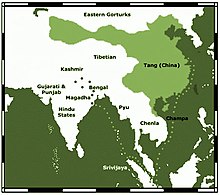Yi Jing (monk)
Yì Jìng , historical Romanization I-Tsing , ( Chinese 義 淨 / 义 淨 , Pinyin Yì Jìng , IPA : [ ˧˩ ji ˩˧ tɕiŋ], name with title 三藏 法師 義 淨 / 三藏 法师 义 淨 , Sānzàng Fǎshī Yì Jìng - "Lit. Yi Jing - Buddhist master of the Tripiṭaka "; * 635 ; † 713 ) was a Buddhist monk who lived at the time of the Tang dynasty . His real name was Zhāng Wénmíng ( 張文明 / 张文明 ).
In 25 years he has traveled to more than 30 countries, collected over 500,000 Buddhist verses in Sanskrit and translated 61 manuscripts into the Chinese language . Posterity owes its travel reports to information about the ancient Srivijaya empire.
His most famous scripts include the Nanhai jigui neifa chuan ( 南海 寄 歸 內 法 傳 , Nánhǎi jìguī nèifǎ zhuàn , Nan-hai chi-kuei nei-fa ch'uan ) and the Datang xiyu qiufa gaoseng chuan ( 大唐 西域 求 法 高僧傳 , Dàtáng xīyù qiúfǎ gāosēng zhuàn , Ta-t'ang hsi-yü ch'iu-fa kao-seng chuan ).
His trip to India
Zhāng Wénmíng became a monk at the age of 14 and was an admirer of Faxian and Xuanzang , who both toured India . He decided to visit Nalanda to study Buddhism in his country of origin, and was funded by a man named Fong . Before leaving, he visited his teacher's grave and said goodbye to his family.
In 671 Yì Jìng boarded a Persian merchant ship in Guangzhou , which reached the coast of Sumatra , at that time part of the Srivijaya Empire, via Annam . He spent two months in Bhoga , learning Malay and studying Sanskrit grammar. His journey took him to countries which he named in his records as Malayu and Kiteh ( Kedah ). Then he sailed on to the "land of naked people" , the Nicobar Islands , which he reached after about ten days in 673. After two weeks he came to Tamralipti on the Indian east coast, where he met a monk from his homeland. After studying for several months in one of the monasteries, they joined a group of traders and moved on to Magadha . On the trip he got sick and stayed behind. Bandits had stolen the monk's clothes after finding nothing of value in him. After a few days he finally reached his destination and stayed in Nalanda for over 10 years .
On the way back to China, he stopped again in the Srivijaya Empire in 687. At that time, the capital, Palembang, was a center of Buddhism, where many foreign scholars gathered. He stayed two years and spent his time translating the collected Sanskrit verses. Because paper and ink were unknown in Srivijaya at the time, he went to Guangzhou in 689, but returned the same year. In 695, Yi Jing returned to his homeland and was received by Empress Wu Zetian in Luoyang .
literature
- Yì Jìng, translated by J. Takakusu: A Record of the Buddhist Religion: As Practised in India and the Malay Archipelago , Clarendon press 1896. Reprint New Delhi, Cosmo, 2006, ISBN 81-206-1622-7 Link digitized
Web links
- To the Navel of the Earth (Engl.)
- Cultural and Cosmological Impact of Iranian Civilization in Vietnam and Peninsular Areas of Southeast Asia (engl.)
- 南海 寄 歸 內 法 傳
- 大唐 西域 求 法 高僧傳
| personal data | |
|---|---|
| SURNAME | Yi Jing |
| ALTERNATIVE NAMES | Yì Jìng; Zhang Wen Ming; Yijing; Yiqing; I Ching; YiChing; I-Tsing; I Tsing |
| BRIEF DESCRIPTION | Chinese monk and translator |
| DATE OF BIRTH | 635 |
| DATE OF DEATH | 713 |
